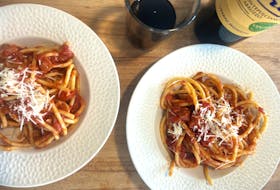Josh Tetrick knows firsthand how eager Canadians were for the arrival of a plant-based egg. From the moment word spread that they were making an egg from a plant, the co-founder and CEO of San Francisco-based food startup Eat Just, Inc. started fielding requests.
“Initially these emails — since I was the only one in the company pretty much — were coming to me,” says Tetrick, laughing. “Since I started the company a little bit over nine years ago, Canadian consumers have always requested this more than anywhere else.”
By April, JUST Egg (called JUST Plant Egg in Canada) will be stocked in nearly 1,700 stores, including various independent grocers and select locations of Buy-Low Foods, Loblaws, Metro, Save-On-Foods, Sobeys, Safeway, Walmart and Whole Foods Market.
Eat Just has begun its Canadian foodservice expansion as well, and the folded version of its plant-based egg will be available at all Copper Branch locations on March 29 as part of the vegan restaurant chain’s new all-day breakfast menu.
So far, demand appears to reflect the years of pent-up anticipation. “The velocities out of the gate even surprised me,” says Matt Riley, senior vice president of global partnerships for Eat Just. “We’re doing over 48 units per store per week on our folded at Whole Foods, for example. It took us a year to make that happen in the U.S. market and we’re doing it in the first month on shelf at Whole Foods in Canada.”
While Tetrick finds this “really interesting,” he wasn’t surprised: “Because for nine years, I’ve been getting these messages.”
Produced by EggSolutions , a food processing company headquartered in Toronto, and made from mung beans, the folded version of Eat Just’s plant-based egg is sold as a four-pack in the freezer aisle (the suggested retail price is $7.99).
Designed to be heated in a toaster, frying pan or microwave, JUST Egg can be chopped up and added to fried rice or noodles, and stuffed in a breakfast sandwich or wrap, as Copper Branch is doing for its all-day breakfast. Menu items include gluten-free pumpernickel bagel sandwiches with JUST Egg and tempeh bacon or a Field Roast Plant-based Breakfast Sausage Patty, and a JUST Egg southwest wrap.
Headquartered in Montreal, Copper Branch is the world’s largest vegan restaurant chain with more than 40 locations in Canada, Western Europe and the U.S., and plans to expand into Australia and New Zealand. CEO Trish Paterson says JUST Egg aligns well with the company’s desire to appeal to “flexitarians,” as well as vegans and vegetarians, with plant-based whole foods.
“We want to have things that (flexitarians) recognize to be natural foods that they would normally eat, and we figure a breakfast sandwich is one of those things,” says Paterson. She finds the innovation and minimal ingredient list of JUST Egg especially compelling. And as a plant-based eater, she appreciates how much it resembles its inspiration: “It’s like eating a real egg.”
Eat Just has sold more than 100 million plant-based eggs since it first launched its pourable product in the U.S. in 2018. Riley anticipates the liquid version, which scrambles like conventional eggs, to be on sale in Canada in three to six months. A new sous vide product will be available at select U.S. stores in the next several weeks, which he expects will eventually roll out in Canada as well.
Attitudes towards plant-based foods have changed drastically since Tetrick started the company nearly a decade ago. Then, when he expressed the idea that eggs didn’t need to come from chickens, the vast majority of people, including friends and family, didn’t expect it to materialize. Now, some of those same skeptics have JUST Egg in their freezers.
“Fast-forward to this world today that we’re living in. A world that’s seen a zoonotic disease sweep the planet. A world where people on a daily basis feel the impact of climate change in their lives. A world where there’s more awareness across the board that our fate has some connection to elsewhere … And the success that JUST Egg has had, not just in Whole Foods, but Walmart,” says Tetrick. “It’s a whole sea change from ‘I’m not sure this could be a thing,’ to ‘it seems like you should go a lot faster.”’
On December 19, 2020, Eat Just made history with GOOD Meat when Singapore approved its cultured chicken nuggets for sale at restaurant 1880 . A group of four youths between the ages of 12 and 17 were the first to dine on the cultured poultry, which sells for the same price as a premium chicken dish would at a restaurant (roughly $29).
In order to gauge consumer attitudes towards cultured meat, Eat Just commissioned a survey of 2,522 Americans and 1,175 Singaporeans. Results suggest that 72 per cent of American and 83 per cent of Singaporean chicken consumers would consider buying cultured meat; 91 per cent of restaurant operators are willing to sell it; and 60 per cent of Americans and 75 per cent of Singaporeans are open to substituting conventional chicken with cultured meat.
Earlier this week, Eat Just announced $200 million in new funding, the bulk of which will be used to increase capacity by setting up large-scale manufacturing infrastructure across Asia, Canada, the U.S. and Western Europe; accelerate research and development; and build the brand.
This year, Tetrick says, Eat Just’s goal is to build a larger manufacturing facility in Singapore, which will support expansion there. They’ve already presented their cultured meat approach to U.S. regulators, and will eventually do the same in Canada in preparation for a North American launch.
Meantime, the company continues to develop its plant-based egg, and version four will be launching in the U.S. before the end of the year. One of their main goals, Tetrick says, is to improve accessibility by getting the price lower than even the cheapest conventional egg.
They’re also continuing to hone taste, colour and texture: “so that there’s not a single person if you had them do a blind taste test that wouldn’t prefer an egg from a plant to a pasture-raised egg. It needs to be that much better. Not the same, but blowing out better.”
Tetrick envisions a future where restaurants might offer plant-based and cultured meat on the same menu, but not both conventional and cultured meat. Where cultured meat is so normalized, it’s simply a given, and to serve both would seem redundant.
“The personal thing I fixate on is, by the time my two-year-old niece, June, graduates from high school, I want that world to be the normal one — where the majority of meat that’s consumed doesn’t need to have one animal be slaughtered or any rainforest be bulldozed,” says Tetrick.
“We have a real opportunity to be a part of that shift in the next 10 or so years. With all the craziness going around, it’s a really awesome time where minds can shift and the world can shift, and we wake up and it just looks different. And I think it will look a lot better.”
Copyright Postmedia Network Inc., 2021








